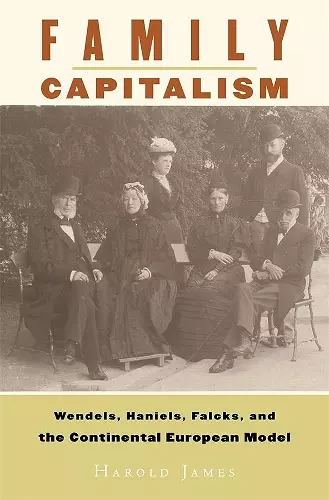Family Capitalism
Wendels, Haniels, Falcks, and the Continental European Model
Format:Hardback
Publisher:Harvard University Press
Published:30th Apr '06
Currently unavailable, and unfortunately no date known when it will be back

This history of three powerful family firms located in different European countries takes place over a period of more than two hundred years. The interplay and the changing social and legal arrangements of the families shaped the development of a European capitalism quite different from the Anglo-American variety.
Qualifying claims by Alfred Chandler and David Landes that family firms tend to be dysfunctional, Harold James shows how and why these steel and engineering firms were successful over long periods of time. Indeed, he sees the family enterprise as particularly conducive to managing risk during periods of upheaval and uncertainty when both states and markets are disturbed. He also identifies the key roles played by women executives during such times.
In Family Capitalism, James tells how "iron masters" of a classical industrial cast were succeeded by new generations who wanted to shift to information-age systems technologies, and how families and firms wrestled with social and economic changes that occasionally tore them apart. Finally, the author shows how the trajectories of the firms were influenced by political, military, economic, and social events and how these firms illuminate a European model of "relationship capitalism."
In the beginning was the family firm. However, many theories of managerial capitalism have theorized the downfall of the family firm by focusing on its disadvantages. Yet families still own and control a significant proportion of even large, internationally-active corporations. By contrast, in Family Capitalism, Harold James highlights many of the strengths of family firms, particularly during periods of crisis or restructuring. At times, families offer a bedrock of trust, values, and long-term continuity. In Family Capitalism, James provides an excellent and insightful story of three major steel companies, de Wendel, Haniel, and Falck, reaching over two centuries. It contributes to the growing field of comparative history and manages to look at long-term continuities in European business development rather than confining the story to classic chronological breaks. The family firm is likely to maintain its significant presence well into the future. -- Jeffrey Fear, Harvard Business School
Family Capitalism is an important contribution to an area of business history that holds particular fascination even for non-specialists, namely, family history. James's approach enables him to transcend the usual concentration on a single family and its enterprises and reflect on the general characteristics of family capitalism in Europe and its role in what has been, after all, one of the most important industries in European industrialization--steel. -- Gerald D. Feldman, University of California, Berkeley
Harold James is the author of several important works of economic history, including studies of the Depression and analyses of the Deutsch Bank during the Nazi period. All of these works involve careful consideration of the interacting cultural, political, and legal factors shaping individual and institutional actors in business and economic life. They are also the fruit of meticulous archival research. In his latest work, Family Capitalism, James brings his scholarly skills to bear upon another important and growing area of inquiry--business families and their role in economic development since the advent of modern capitalism--and, in doing so, confirms his reputation as one of the world's preeminent historians of finance, banking, and business...James' purpose is refreshingly different. -- Samuel Gregg * Journal of Markets and Morality *
Although James raises more questions in this book than he can answer, his three well-crafted case studies make a significant contribution to the ongoing reconsideration of family capitalism and its role in the economic development of modern Europe. I highly recommend them. -- Michael S. Smith * Journal of Modern History *
- Nominated for Best Book Award in European Politics and Society 2007
ISBN: 9780674021815
Dimensions: unknown
Weight: unknown
448 pages